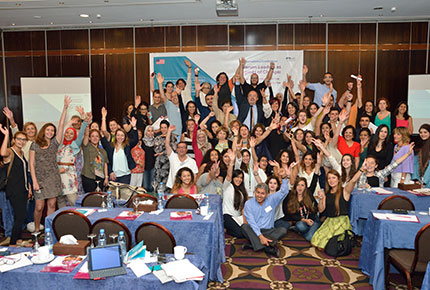Activists and students gather for the empowerment of women
Speakers from around the world tell students about the role of women in the changes taking place in the MENA region.
“I have seen how men have failed us. Half the Arab world is being destroyed right now because of the egomaniacal decision making taking place,” said Walid Touma — director of LAU’s University Enterprise Office — speaking on the sidelines of a conference about women leaders organized by the university’s Institute for Women’s Studies in the Arab World this week.
The UEO runs the LAU-MEPI Tomorrow’s Leaders program that instigated the conference and has enabled dozens of students from across the Arab world to study at LAU.
“The opportunity to hear about how change agents have suffered and are moving forward is a great opportunity for the (LAU-MEPI TL) 54 students and alumni we invited to come together,” said Touma. He was referring to the many young and veteran women’s rights activists who gathered in Beirut from all over the Arab world and beyond to share their stories of oppression and resistance.
While former Egyptian diplomat Moushira Khattab reeled off a list of achievements made by Egyptian women over the past century, Libyan judge Naima Gebril spoke about the demise of women’s rights since the 2011 revolution. Gebril ended her presentation with an impassioned retrospective of photographs of empowered women in Libya in the 1950s. “You are the future, so raise your children accordingly,” she told the audience.
Overviews of historical achievements and losses were complemented with practical insights into structural and organizational challenges. Veteran Indian activist Srilatha Batliwala, for example, addressed the problem of power-dominance inherent in many non-profit organizations, including those that aim to combat feminism.
“Organizational leaders must balance their power with the principles, politics and practices of an organization if it is to succeed,” advised Batliwala, speaking to the audience via video link. “Many suffer from the founder-leader syndrome and loose sight of the purpose of the organization.”
The diversity of the speakers and topics covered was much appreciated by the students and alumni whose passion and experience are among the reasons they were selected to join the MEPI-TL program. “It’s more than just a scholarship. It’s about making a change and being leaders of our countries,” said Bahraini student Dana Mudara. “Dr. Touma always tells us that women’s empowerment is a priority of the program, and through this conference I understood why.”
While Mudara’s belief in feminism was strengthened through the first-hand accounts of resistance and resilience depicted by a diverse group of panelists, her colleague Shams Shamsan found herself engaged by the diversity of the topics covered. “We tackled various aspects of women’s rights this week - the societal, political, economic and religious - and considered various players. It was enlightening and now I’m ready to commit to an action,” said the Yemeni accounting major.
A plethora of priority issues and actions were proposed during the final session of the conference Thursday afternoon. As part of a desire to see hundreds of young Arab women in parliament and a female Arab president, Touma proposed the creation of a “war room” of experts to support MEPI alumna Ghid Amhez in her candidacy for Lebanese Parliament. “She is a beacon of light for all our students to learn from,” said Touma of Amhez, who led a team of LAU medical students in the recent rehabilitation and reopening of a dispensary in her Bekaa hometown.
While Amhez presented the project as an example of how youths must lead by example, Syrian MEPI-TL student Nathir Haimoun received a standing ovation for his inspired Arabic poem about a young Arab woman in search of freedom: “I want a life without suffering and subjugation… I pledge, to myself and my glory, to be free and work toward the liberation of women… for the time of heinous ignorance has come to an end.”
More
Latest Stories
- SOE Launches its Distinguished Scholar Visiting Program with International Guest Dr. Feras Batarseh
- LAU Nursing Camp Opens Eyes, Hearts and Futures
- Meet Dr. Zeina Khouri-Stevens, Executive Vice President for Health Services
- LAU Family Medicine Graduates to Benefit from a Partnership With Nova Scotia
- AKSOB Assistant Professor Shares Her Vision for the Future of Learning
- LAU Simulation Models Celebrate 20 Years of Learning, Leadership and Service
- The School of Engineering Hosts the Lebanese Electromagnetics Day
- LAU Stands Out on the Sustainability Scores


